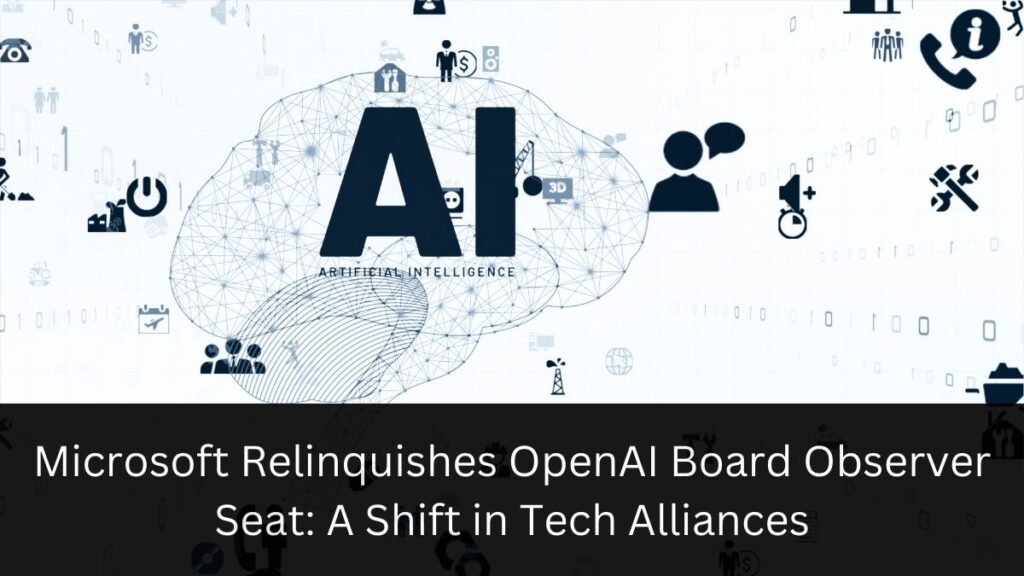In the ever-evolving landscape of artificial intelligence, a significant change has occurred in the relationship between two tech giants. Microsoft, a key player in the AI arena, has decided to step back from its observer seat on OpenAI’s board. This move marks a new chapter in the intricate dance of partnerships and governance in the tech world.
The Decision Unveiled
Late on a Tuesday evening, Microsoft made a surprising announcement. In a letter to OpenAI, the company confirmed its decision to give up its non-voting observer role on the board, effective immediately. This revelation sent ripples through the tech community, prompting questions about the future of AI collaborations and corporate governance.
A Vote of Confidence
Microsoft’s decision wasn’t born out of discord. Rather, it stemmed from a place of assurance. In their communication, Microsoft expressed confidence in OpenAI’s current direction and leadership. They noted “significant progress” over the past eight months, suggesting that their oversight role had served its purpose.
“We have witnessed significant progress from the newly formed board and are confident in the company’s direction,” Microsoft stated in their letter. This sentiment reflects a maturing relationship between the two entities, moving from cautious oversight to mutual trust.
The Historical Context
To fully appreciate the weight of this decision, we must rewind to November of the previous year. OpenAI faced a tumultuous period with the sudden ouster of Sam Altman, its CEO. Microsoft, a major investor in OpenAI, played a crucial behind-the-scenes role during this crisis.
Microsoft’s Pivotal Role
In the wake of Altman’s departure, Microsoft pushed for an observer seat on OpenAI’s board. This move was seen as a stabilizing force during a time of uncertainty. Microsoft’s involvement was instrumental in securing Altman’s return and implementing changes to OpenAI’s governance structure.
The Reconstituted Board
Following the upheaval, OpenAI embarked on rebuilding its board. The new lineup retained only one previous member, Adam D’Angelo, while adding fresh faces:
- Bret Taylor as chairman
- Larry Summers, former Treasury Secretary
- Sam Altman, returning as both CEO and board member
- Paul Nakasone, former NSA official (most recent addition)
This diverse group of leaders signaled a new era for OpenAI, blending tech expertise with policy experience.
Implications of Microsoft’s Exit
Microsoft’s departure from the board observer role carries several implications for both companies and the broader tech ecosystem.
A Sign of Stability
By relinquishing its seat, Microsoft is essentially giving OpenAI a vote of confidence. This move suggests that the tumultuous period has passed, and OpenAI has found its footing under the new leadership structure.
Antitrust Considerations
From a strategic standpoint, Microsoft’s exit removes a potential sticking point for antitrust regulators. The tech giant’s significant involvement with OpenAI had raised eyebrows in regulatory circles. By stepping back, Microsoft may be preemptively addressing concerns about its influence over the AI company.
Changing Dynamics in Tech Partnerships
This development highlights the evolving nature of partnerships in the tech world. It demonstrates how companies can maintain strong alliances without direct board representation, potentially setting a new precedent for corporate collaborations.
The Broader AI Landscape
Microsoft’s decision comes at a time of rapid developments in the AI field. Other tech giants are also making moves to secure their positions in this competitive space.
Apple’s Emerging Role
Reports had suggested that Apple executive Phil Schiller might take an observer seat on OpenAI’s board. This speculation followed a partnership announcement between Apple and OpenAI, which would allow iPhone and Mac users to access ChatGPT through Siri.
However, with Microsoft’s departure, OpenAI has indicated that it no longer plans to have any observers on its board. This shift suggests a move towards greater independence in OpenAI’s governance structure.
Looking Ahead: The Future of AI Collaborations
As the dust settles on this latest development, several questions emerge about the future of AI partnerships and governance:
- Will other tech companies follow Microsoft’s lead in stepping back from direct board involvement with AI partners?
- How will OpenAI’s new approach to engaging with strategic partners and investors shape the company’s future decisions?
- What impact will this have on the broader AI ecosystem and the race for AI dominance?
Microsoft’s decision to give up its OpenAI board observer seat marks more than just a change in corporate structure. It signifies a maturing relationship between two AI powerhouses and potentially sets a new standard for how tech giants collaborate in the AI space.
As we move forward, the tech world will be watching closely to see how this shift impacts both companies and the broader AI landscape. Will it lead to more independent AI entities, or will we see new forms of partnerships emerge?
One thing is clear: the AI revolution continues to evolve at a breakneck pace, and today’s decisions will shape the technological landscape of tomorrow. As observers and participants in this digital age, we must stay informed and engaged, ready to adapt to the next big shift in the world of artificial intelligence.
What are your thoughts on this development? How do you see it impacting the future of AI collaborations and governance? Share your perspectives and join the conversation about the ever-changing landscape of technology and corporate partnerships.

